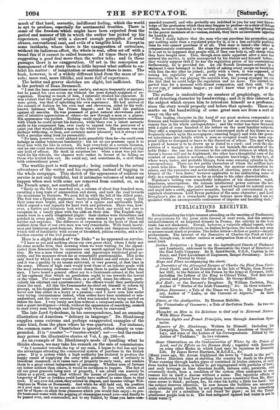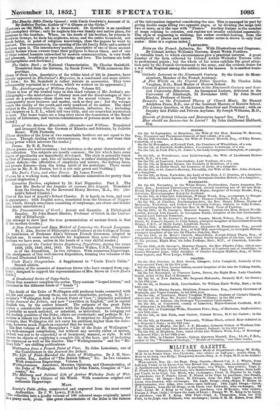PUBLICATIONS RECEIVED.
Boors.
Notwithstanding the triple interest attending on the meeting of Parliament, the preparations for the great state funeral of next week, and the ominous reestablishment of an Imperial dynasty in France, the activity in the book trade has not slackened. Except, however, a valuable official report, with- out the customary official dryness, on Italian Irrigation, the booksdo not seem to possess much mark or promise. The belles lettres—fiction or poetry—largely predominate. The interest of the Narrative of Charles the First at Canis- brook, though real, is rather curious or antiquarian than of a broad and ge- neral kind.
Italian Irrigation : a Report on the Agricultural Canals of Piedmont and Lombardy, addressed to the Honourable the Court of Directors of the East India Company. By R. Baird Smith, F.G.S., Captain in the Army, and First Lieutenant of Engineers, Bengal Presidency. In two volumes. Printed by Order. Maps and Plans accompanying the above.
A Narrative of the Attempted Escapes of Charles the First from Can's- brook Castle, and of his Detention in the Isle of Wight, from Novem- ber 1647; to the Seizure of his Person by the Army at Newport, 1648; including the Letters of the King to Colonel Titus. Now first deci- phered and printed from the Originals. By George /Mier. Bed Hall ,• or the Baronet's Daughter. By William Carleton, Esq., Author of " Stories of the Irish Peasantry," &c. In three volumes. Milton Davenant ; a Tale of the Times-we Live in. By James Bandi- nel, Author of " Lufra, or the Convent of Algarve." In three volumes.
Pierre, or the Ambiguities. By Herman Melville. The Vicissitudes of Commerce; a Tale of the Cotton Trade: In two vo- lumes.
Thoughts on Man in his Relations to God and to External Nature With Minor Poems.
Parisian Sights and French Principles, seen through American Spec- tacles.
Memoirs of Dr. Blenkinsop. Written by Himself. Including his Campaigns, Travels, and Adventures ; with Anecdotes of Graphio- logy, and some of the Letters of his Correspondents. Edited by the Author of "Paddiana." In two volumes: Some. Observations on the Contamination of Water by the Poison of Lead, and its Effects on the Human Body ; together with Remarks on some other Modes in which Lead may be injurious in Domestic Life. By James Bower Harrison, M.R.C.S.L., &c. [Many years ago, Mr. Accum frightened the town by "death in the pot Mr. Bower Harrison aims at startling the country by death in the pump. Water running through leaden pipes or contained in leaden cisterns, or used from leaden lined boilers, is liable to get impregnated with particles of lead; and such beverage in time disorders health, induces colic, paralysis, and eventually death, from a condition of the system often analogous to ms- rasmus but in itself a disease without a name. The injurious effects, of water adulterated by lead have perhaps been more considered than Mr. Har- rison seems to think ; perhaps, too, he rides his hobby a little too hard : but the subject deserves attention. In new houses the builders are unconsci- ously assisting public health by not putting leaden cisterns, but something cheaper. As yet a substitute is not found for pipes; so let the Total- abstnience people look to it. The best safeguard against bad water is not to
drink water!' -
The Family Bible Newly Opened ; with Uncle Goodwin's Account of it. By Jefferys Taylor, Author of "A Glance at the Globe." [Lettuces on the Bible, set in a framework. Dr. Goodwin is an excellent and exemplary divine ; only he neglects his own family and native place, for missions to the heathen. When, on the death of his brother, he returns to
Goodwin Grange, he finds his nephews, niece, and the entire household, not much better, in point of religious knowledge, than the pagans he went to
convert. The consequence is, the opening of the old family Bible and a series of lectures upon it. The introductory matter, descriptive of one of those ancient family houses whose owners trace their pedigree to Saxon times, and of one of those retired hamlets untouched by modern communication, is very fresh and pleasant, breathing at once knowledge and love. The lectures are both bibliographical and doctrinal.] The Cabin Book ; or National Characteristics. By Charles Sealsfield. Translated from the German, by Sarah Powell. With numerous En- gravings.
[Some of these tales, descriptive of the wilder kind of life in America, have already appeared in Blackwood's Magazine,.in a condensed and more artisti- cal form ; for Mr. Sealsfield is rather minute in accessories. They were subsequently reprinted in a volume, which we noticed on its appearance.]
The .Autobiography of William Jerdan. Volume III.
[There is less of the wonted topic in this third volume of Mr. Jerdan's au- tobiography-the misfortunes of literary men and the disadvantages of lite-
rature as a profession-than there was in the second volume. There is consequently more business and matter, such as they are ; but the volume wants the reality of the youthAnd early manhood of its author. The chief subject is the Literary Gazette, its contributors, influence, &c. ; including two chapters on L. E. L., which tell very little, and are somewhat mysterious to boot. The lesser topics are a long story about the foundation of the Royal Society of Literature, and various reminiscences of persons more or less cele- brated.]
Lives of the Brothers Humboldt, Alexander and William. Translated and arranged from the German of Klencke and Schlesier, by Juliette Bauer. With Portraits.
[These sketches of the lives of two remarkable brothers are not equal to the themes. Though dealing with circumstances, they are dry, and want that living power which interests the reader.] Poems. By B. R. Parkes. [These poems are well-sounding ; but imitation is the great characteristic of the collection. The subjects are mostly common - the few which have some
degree of peculiarity are imperfectly. developed. he style is generally based on that of Tennyson ; and, like all imitations, is rather distinguished by the salient defects-the affectation of simplicity and nature, the halting lines, and prosaic flatness-than the living spirit of the prototype. There seems promise in Mr. B. R. Parkes, but it is yet only green and budding.]
The Poet's Voice, and other Poems. By James Powell. [Verses by a working man, which rather indicate admiration for poetry than poetical inspiration.]
Cornelius Tacitus, explained by Dr. Karl Nipperdey. Part I. The first Six Books of the Annales ab excessu divi Augusti. Translated from the German, by the Reverend Henry Browne, M.A., &c. (Ar- nold's School ClarLics.) [One of the best of Arnold's School Classics. It is handy in form, and neat in appearance ; with English notes, translated from the German of Nipper- dey, which, though sometimes consisting of surplusage, are closer and briefer than many annotations.]
The Pronunciation of Greek ; Accent and Quantity. A Philological Inquiry. By John Stuart Blackie, Professor of Greek in the Univer- sity of Edinburgh. [An attempt to show that the true pronunciation of ancient Greek is that of the modem Greeks.]
A.New Practical and Easy Method of I.carning the French Language. By F. Ahn, Doctor of Philosophy and Professor at the College of Neuss. IA translation of Professor Alm's German French Grammar, adapted to
English use.- It seems less available for beginners than some other intro- ductions we have seen, unless in the hands of a very skilful master.] Narrative of the United States Exploring 1.7xpedition, during the years 1838, 1839, 1840, 1841, 1342. By Charles Wilkes, U.S.N., Command- er of the Expedition. In two volumes. With numerous Engravings. [An abridgment of this well-known Expedition, forming two volumes of the National Illustrated Library.] Uncle Tom's Companions. A Supplement to "Uncle Tom's Cabin." Second edition.
[A collection of the memoirs of American slaves who have escaped from cap- tivity; designed to support the representations of Mrs. Stowe in Uncle Tom's Cabin.] A Graduated Series of Copy-books. [These four numbers complete the series. They contain " looped letters," and exercises in the different kinds of " hands "]
The death of the Duke of Wellington still produces books connected with his life and career. Among these, the most remarkable, perhaps, is M. Le- moinne's "Wellington from a French Point of View "; originally published in the Journal des Debats, and now "rewritten in English," and in capital English too, by the author himself. The estimate of the great Duke argues a considerable acquaintance with the English character. Its defect is probably as much national, or artistical, as individual. In bringing out the leading qualities of the Duke, others are overlooked ; and perhaps M. Le- moinne is almost too French in his views. It surprises no Englishman, for example, that Wellington did not carry his ambition higher than the duke- dom, however much Napoleon expected that he would. The first volume of Mr. Stocqueler's "Life of the Duke of Wellington" is a well-arranged compilation, but without any novelty either of matter, (which was not to be expected,) or of treatment, manner, or style. It will answer its objects of supplying a complete life of the hero, and of including the statesman as well as the warrior. The "Wellingtoniana" and the "Mi- litary Life" are shilling publications.
Wellington from a French Point of View. By John Lemoinne, one of the Contributors to the Journal des Debate.
The Life of Field-Marshal the Duke of Wellington. By J. H. Stoc- queler, Esq., Author of "The British Officer," &c. In two volumes. With numerous Engravings. Volume L
Wellingtoniana. Anecdotes, Maxims, Opinions, and Characteristics, of the Duke of Wellington. 'Selected by John Timbs, Compiler of "La- conies," &c.
The Military and Political Life of Arthur Wellesley Duke of Wel- lington. By a Citizen of the World. With numerous original and authentic Engravings. MArs.
Lowry's Table Atlas, constructed and engraved from the most recent Authorities. By J. W. Lowry, F.R.G.S.
[The collection into a goodly volume of 100 coloured maps originally issued at a penny each, plain, One great characteristic of the Atlas is the fulness
of the information imparted considering the size. This is managed in part by giving double maps filling two opposite pages, or by dividing the maps into two or more, as is the case with " France." Another feature is the number of maps relating to colonies, and regions not usually exhibited separately. The style of engraving is striking, but rather crowded-looking, from the multiplicity of places and names. The entire series is drawn to only four scales : there is a copious index.] PAteHrarrs.
Notes on the French Infantry, &c. With Illustrations and Diagrams. By Colonel Arthur Wellesley Torrens, Royal Welsh Fusiliers. [A valuable tract, to which circumstances give a practical interest. A great number of the facts collected by Colonel Arthur Wellesley Torrens refer to professional points ; but the whole of his notes exhibits the great atten- tion paid by the French Government to the army, and the evident desire for a war with England among the slabbery and the masses. Is is another warn- ing.]
Catholic Interests in the Nineteenth Century. By the Ootmt de Mont- alembert, Member of the French Academy. A Few Words on the Crystal Palace Question. By Charles John Vaughan, D.D., Head Master of Harrow School.
Classical Literature in its Relation to the Nineteenth Century and Scot- tish University Education. An Inaugural Lecture, delivered in the University of Edinburgh, 2d November 1862. By John Stuart Blaekie, Professor of Greek. Remarks on the Protestant Theory of Church Music. By Steuart Adolphus Pears, B.D., one of the Assistant Masters of Harrow School. The Lunacy Question, or the Lunatic Benefited and Protected ; with an Inquiry into Public and Private Asylums. By Joseph Williams, M.D., &
Records of British Colonies and Enterprise beyond Sea. Part'I.
How should an Income-tax be Levied ? By John Gellibrand Hubbard, Esq.



























 Previous page
Previous page